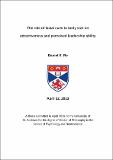Files in this item
The role of facial cues to body size on attractiveness and perceived leadership ability
Item metadata
| dc.contributor.advisor | Perrett, David | |
| dc.contributor.author | Re, Daniel E. | |
| dc.coverage.spatial | 253 | en_US |
| dc.date.accessioned | 2014-02-13T10:38:17Z | |
| dc.date.available | 2014-02-13T10:38:17Z | |
| dc.date.issued | 2013 | |
| dc.identifier | uk.bl.ethos.595610 | |
| dc.identifier.uri | https://hdl.handle.net/10023/4440 | |
| dc.description.abstract | Facial appearance has a strong effect on leadership selection. Ratings of perceived leadership ability from facial images have a pronounced influence on leadership selection in politics, from low-level municipal elections to the federal elections of the most powerful countries in the world. Furthermore, ratings of leadership ability from facial images of business leaders correlate with leadership performance as measured by profits earned. Two elements of facial appearance that have reliable effects of perceived leadership ability are perceived dominance and attractiveness. These cues have been predictive of leadership choices, both experimentally and in the real-world. Chapters 1 and 2 review research on face components that affect perceived dominance and attractiveness. Chapter 3 discusses how perceived dominance and attractiveness influence perception of leadership ability. Two characteristics that affect both perceived dominance and attractiveness are height and weight. Chapters 4-9 present empirical studies on two recently-discovered facial parameters: perceived height (how tall someone appears from their face) and facial adiposity (a reliable proxy of body mass index that influences perceived weight). Chapters 4 and 5 demonstrate that these facial parameters alter facial attractiveness. Chapters 6, 7, and 8 examine how perceived height and facial adiposity influence perceived leadership ability. Chapter 9 examines how perceived height alters leadership perception in war and peace contexts. Chapter 10 summarises the empirical research reported in the thesis and draws conclusions from the findings. Chapter 10 also lists proposals for future research that could further enhance our knowledge of how facial cues to perceived body size influence democratic leadership selection. | en_US |
| dc.language.iso | en | en_US |
| dc.publisher | University of St Andrews | |
| dc.subject.lcc | BF859.R4 | |
| dc.subject.lcsh | Face perception | en_US |
| dc.subject.lcsh | Physiognomy | en_US |
| dc.subject.lcsh | Interpersonal attraction | en_US |
| dc.subject.lcsh | Leadership | en_US |
| dc.title | The role of facial cues to body size on attractiveness and perceived leadership ability | en_US |
| dc.type | Thesis | en_US |
| dc.type.qualificationlevel | Doctoral | en_US |
| dc.type.qualificationname | PhD Doctor of Philosophy | en_US |
| dc.publisher.institution | The University of St Andrews | en_US |
This item appears in the following Collection(s)
Items in the St Andrews Research Repository are protected by copyright, with all rights reserved, unless otherwise indicated.

